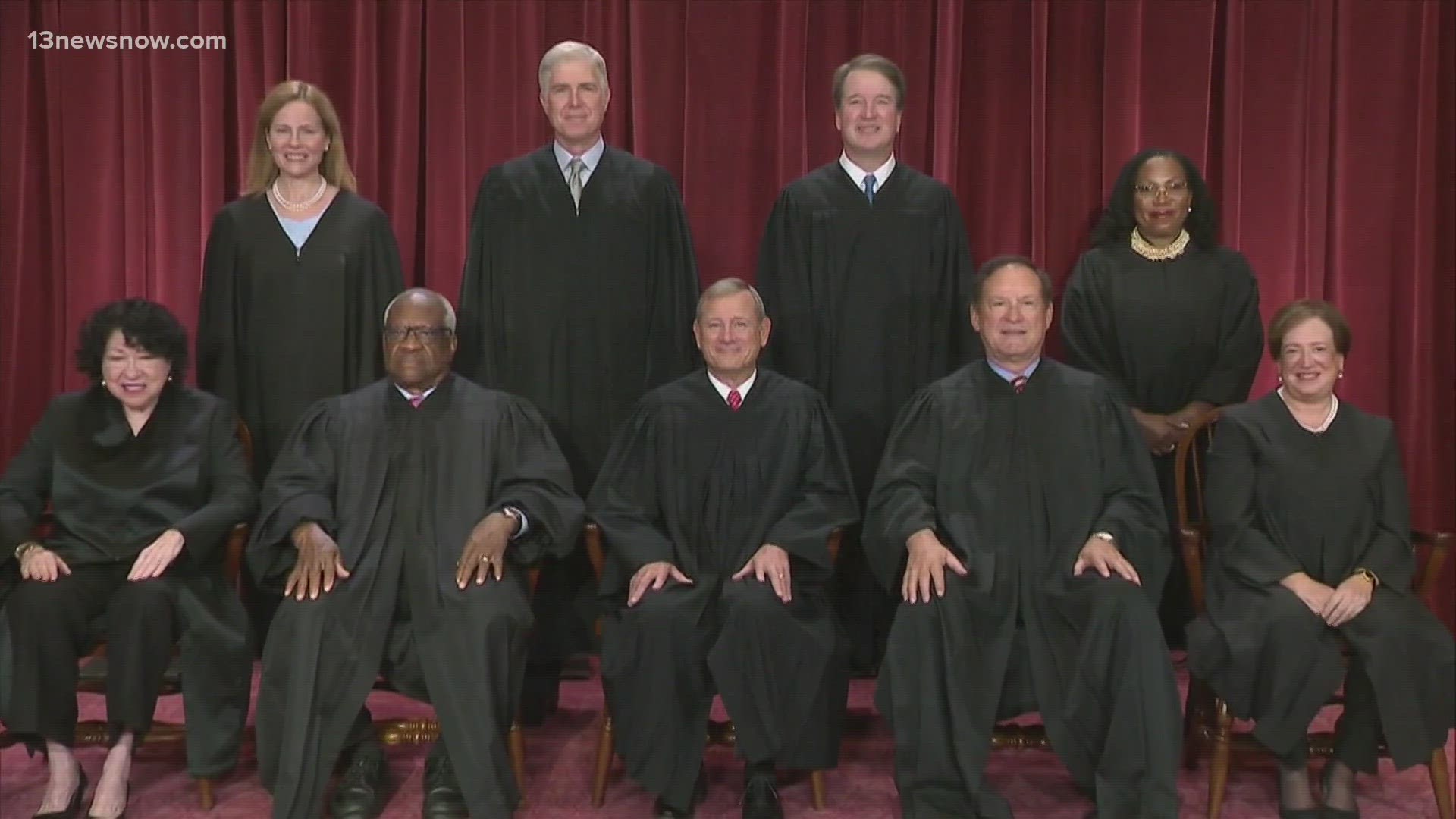NORFOLK, Va. — The Supreme Court on Thursday struck down affirmative action in college admissions, declaring race cannot be a factor and forcing institutions of higher education to look for new ways to achieve diverse student bodies.
The court's conservative majority overturned admissions plans at Harvard and the University of North Carolina, the nation's oldest private and public colleges, respectively, according to a report from the Associated Press.
RELATED: Supreme Court strikes down affirmative action, bans consideration of race in college admissions
Virginia's elected leaders at the state and federal levels are starting to react to the high court's ruling along party lines, with Republicans praising the decision and Democrats speaking out.
Here's what they've had to say.
Virginia Gov. Glenn Youngkin
"Today, after the Supreme Court's ruling, we are closer than ever before to ensuring that an individual's future opportunities are unlocked based on the trajectory of their potential, their aspirations, and the quality of their capabilities as opposed to simply on their race."
Virginia Lt. Gov. Winsome Earle-Sears
"I applaud the Supreme Court's landmark ruling today that will ensure college admissions are based on a student's merits, not the color of their skin. Students across America, regardless of their background, will now have access to the best educational opportunities available and be judged on their academic achievements and the content of their character — as they should be. Today's decision is a tremendous victory for our country and gives our children a hope and a future. America continues to work toward her declared ideal that all men are created equal."
US Rep. Bobby Scott (VA-03)
“The Supreme Court has long held that our nation has a compelling interest in fostering racially diverse campuses. Holistic college admissions practices that narrowly tailor the use of race as one of many factors in evaluating prospective students are a key to fostering such diversity in higher education. Such admissions policies not only support historically underserved students—research confirms that diverse campuses also provide all students with a quality, well-rounded education. Today the Supreme Court decided, with little regard for the repercussions, that institutions of higher education cannot pursue these compelling interests.
“Regrettably, the Supreme Court’s decision to end the consideration of race as a factor in college admissions is a significant setback in our effort to eliminate disparities in access to higher education and ensure diverse learning environments for all students. It is now imperative that we review other facets in college admissions that research shows are racially discriminatory and have a disparate impact and determine if they too need to be eliminated, given today’s ruling.
“Race-conscious admissions policies provided a counterbalance to these discriminatory factors—such as inequitable K-12 schools, racially biased admissions tests, and developmental and legacy admissions—that all marginalize students of color. Now that the Court has invalidated that balance, I call on the Attorney General to start filing cases now against any current school practices that violate the Equal Protection Clause and Title VI of the Civil Rights Act because they have discriminatory impact.”
US Rep. Jennifer McClellan (VA-04)
“Today’s disappointing Supreme Court ruling dismantles affirmative action and undermines an important effort to address racial inequality caused by our nation’s history with racism. This holistic approach to college admissions was integral to creating opportunity for disadvantaged Black and Brown communities. The impact of 246 years of slavery and 100 years of Jim Crow on our communities and institutions did not go away with a magic wand.
“Racial minorities face greater obstacles to educational and economic mobility due to systemic segregation and inequity that persists in neighborhoods, in our school systems, and our country at large. Low-income children and children of color are more likely to live in underfunded school districts. They are also less likely to have parents who pursued higher education or to attend preschool or other early childhood education programs. All of these factors contribute to opportunity gaps that set them at a disadvantage in the college admissions process.
“My own parents experienced the impact of racial discrimination in education in the Jim Crow South, and how education creates opportunities for individuals and communities impacted by generations of racism. Those experiences led them to a lifelong commitment to addressing those impacts as educators, a commitment I share as a legislator. It is deeply disturbing that the Supreme Court ruled today to restrict opportunities for generations to come.
“The Court’s decision to strike down affirmative action and undermine this critical initiative that has existed for nearly sixty years is detrimental to our nation as a whole and ignores the challenges communities of color face. We must continue to reckon with our nation’s past and work to advance policies that address intergenerational disparities and create opportunity for every American, regardless of their race, socioeconomic status, or background.”

